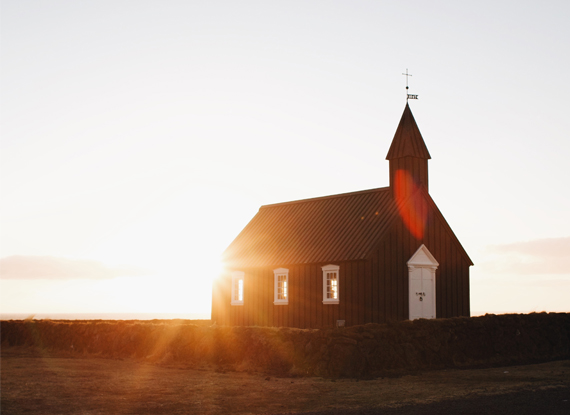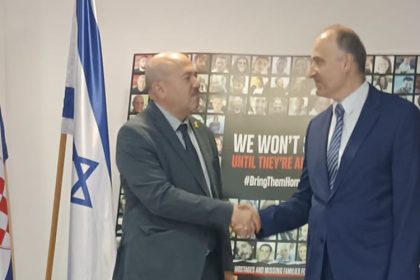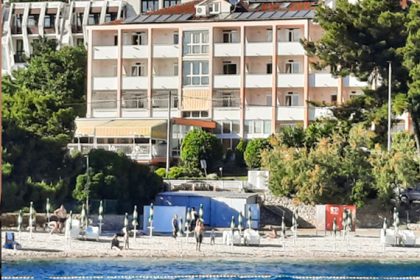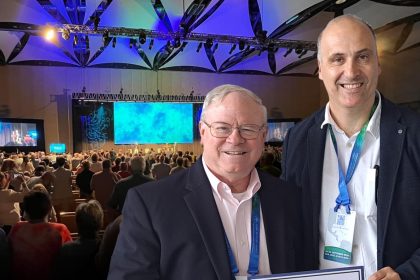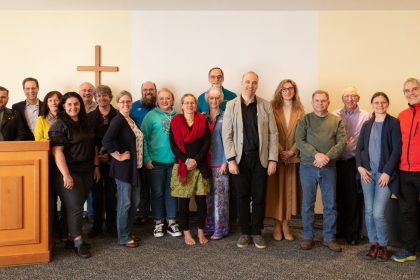September 2023
Today we are honored to have the opportunity to speak with pastor Vatroslav Župančić, a man whose life story radiates inspiration and deep belief. Pastor Župančić is not only a theologian and master of history, but also an individual who went through various stages of life, from a dynamic youth with few ties to the Church, through participation in the Homeland War, to a deep Christian conversion at the age of 23. Through his life and actions, Pastor Župančić became an extremely important voice in the community. Through many years of working in the real sector, he has gained a deep understanding of the everyday challenges that people face. However, his dedication to religion and service to the Church did not go unnoticed. He is a long-time preacher and evangelist, the founder of the association Reforma – an organization that promotes ethics, morality and family values, and a long-term member of the Association of Veterans, Soldiers and Patriots.Pastor Župančić is not only locally known and respected, but also internationally recognized, with many years of experience in pastoral ministry in Germany, where he worked within the Evangelical Methodist Church. In 2021, he was elected presiding pastor of the same church and actively works as a pastor of the church municipality in Zagreb.In addition to his religious and church service, Pastor Župančić is also a family man. He is married and the father of two children, which further enriches his perspective on life and society.In this interview, we will talk with Pastor Župančić about his journey, his views on society, education and youth, as well as current topics that shape Croatia today. We will also explore his deeper thoughts about faith, pastoral ministry, and his messages and advice for the citizens of Croatia.
Pastor Župančić, can you tell us a little more about yourself and your journey from dynamic youth to the position of pastor and activist in the church and civil society?
-I was born in German yin a family called Returned guest workers. My father wanted us to return as a family because he was nationally conscious and wanted me to study in my native language in Croatia, which was then still in communist Yugoslavia. For me, as a child in my formative age, it was a big shock to come from prosperity and freedom in the West to the grayness of the time, the economic poverty, and the ideology that elementary school children were already exposed to. I grew up in the years of the collapse of communism and, ultimately, the war, in which, at the end of it, I got involved myself as a nineteen-year-old. I received the basics of the Christian faith through Catholic religious education. As a child, I was active and participated in ministry meetings, where I began to feel the call of God. However, the pleasures and adventures of youth prevailed, which ultimately did not fulfill me. In my search for meaning and truth, I experienced a dramatic change at the age of 23, which is theologically called a new birth, which changed the direction of my life. God and faith became the priorities of my life. I joined the evangelical church attracted by their simple approach to the Christian faith but at the same time serious approach to the Holy Scriptures. After my theological education, I was involved in the active service of a pastor, which I zealously strive to continue to do.
How do you generally see the state of society today, and do you think that Croatia is going in the right direction? Do you have the impression that the state cares enough about young people and the culture of education? In your opinion, what are the biggest challenges facing young people today ?
Croatian society has experienced enormous changes in the last few decades. From a country with an undemocratic system, through the horrors of war, a great victory in the Homeland War, through a multi-year, often blackmailing process for entry into Western integration, to the final membership in the EU. Croatia has achieved wonderful results and this shows that as a nation we have the strength and ability to resist many challenges. However, at the same time, Croatia is experiencing a large drop in the birth rate and the departure of young people abroad. Corruption remained very present in institutions. All these negative trends are also present in other countries, but what is surprising is that our authorities reacted too passively to these trends, and in some cases, like the authorities in the capital, a radical anti-natality policy is implemented. I am amazed by this irrational approach to demographic problems, despite many years of warnings by top experts like professors Šterc and Akrap. If we do not listen to the warnings of such experts and if the government does not seriously and continuously encourage the birth rate policy, we are threatened with demographic, cultural and economic collapse.As for education, our children and youth are getting a lot of knowledge, but there is a noticeable decline in values, etiquette and culture of behavior. Programs such as the so-called Civil education, which is exactly the opposite of the traditional and civil culture of our people. What is positive is Croatia’s sport successes, and in that field we should continue to invest in young people. When I was in Germany, people admired how such a small nation has so many good athletes, and I used to answer them that in the meantime we also produce the best electric car in the world. Science is also a branch that has a future in Croatia.
Given your experience in associations and civil society activities, can you comment on events and phenomena in Croatia regarding transgender ideology? How should the Church and society approach these issues? How do you see the role of the Church in modern society and how can the Church contribute to positive changes? Can you tell us more about your involvement in the association Reforma and the goals of that association in promoting ethics, morals and family values?
The relationship between church and society has been discussed for two thousand years. History has shown that the church – as the people of God and as an institution – always functioned best and fulfilled its Christ-given function when it was at a critical distance from the authorities. This is necessary in order for the Church to maintain its prophetic mission and preach the original evangelical teaching. Every time money, power or privileges became a priority issue in the church – the corruption of religion and its institutions would occur. Such was the situation in the fifteenth and sixteenth centuries and that is why the reformation within Western Christianity was necessary. Subtle secularization is present in contemporary society, through new forms of ideologies such as the transgender one you mentioned, but also through the imposition of various alternatives to marriage and family. If they were to follow the media, one would get the wrong attitude that these things are self-evident, necessary and modern as they want to be presented. However, as we saw with the referendum on marriage, the vast majority of people do not support such types of “modernity”. Churches and religious communities, by their basic mission, are those that especially emphasize and take care of the values of marriage and life. Namely, God created the institution of marriage and family before the institution of church and state. That is why any culture that stops valuing marriage and family has no future.My social involvement in the Reform association, but also now as a church official, comes from my faith. The Christian faith cannot be passive or reduced to mere formalism and sacramentality. True faith is always a public faith and must be focused on society and care for one’s neighbors. People like the founder of the Red Cross, Henry Dunand, or pastor Martin Luther King, who publicly fought against racial segregation, and thousands of believers throughout history were guided by this ideal.This belief guides me and my colleagues. When we noticed more than ten years ago that there were many veterans who took their own lives, we tried to give an answer to that. We invited to Croatia a Vietnam veteran from the USA who overcame PTSD problems through faith and writing a book. That was all we could do at that moment, but thank God we helped many people, who sent us letters of thanks at the end of this project.
How do you perceive your role as pastor of the Methodist church, and what do you consider the most important challenges and goals in that role? Considering your experience in Germany and Croatia, can you compare the differences in the perception of religion and faith between those two countries? How do you personally integrate your faith and spiritual life into your everyday life and family? How do you see the future of the Church and faith in Croatia? What changes or adjustments do you consider crucial in the modern world? How do you deal with the challenges and stress that come with pastoral service and activism? Do you have a message or advice for the citizens of Croatia in the light of your experience and your involvement?
-Methodism is part of Protestantism in Croatia. In a country where national identification is equal to religious identification, as it is in our country, it is sometimes difficult to explain that Protestantism is not a foreign thing in the Croatian cultural being. On the contrary, Croatian theologians, priests and even bishops played very important roles in the Protestant Reformation. They tried to provide the people with a translation of the Holy Scripture long before the emergence of national revivals. The existing legal frameworks give religious communities a lot of space and autonomy, which I mentioned that the Church needs. Also, Methodist priests, like other Protestant clergymen, are allowed to marry and start families, which is a great enrichment. A family atmosphere is good for service because it makes a person better understand the everyday and real life of someone who is then enriched with Christian spirituality. We also know that many children of priests gave great contributors to society, like Nikola Tesla or Angela Merkel for example. Service in Germany was a great school for me. I could be a pastor in big cities and be part of the German evangelical tradition. Unfortunately, I witnessed the collapse of Germany as a Christian nation. Fewer and fewer people are connected to the Church, and many clergy and laity have capitulated to the spirit of the times (Zeitgeist is originally a German word). Rainbow flags are waved in front of both Evangelical and Roman Catholic churches – which is a scandalous betrayal of faith. The pressure on those who still advocate the classical evangelical teaching has become very strong. Thus, recently, a pastor-activist for the unborn had his meeting interrupted in which he wanted to point out the problems of abortion, due to threats from militant activists. Of course, there are many scandals and other things that have happened in churches that call for self-criticism, repentance and discipline, but deviation from the basics of faith is unacceptable, and this is happening in Germany. This should be a lesson to us in Croatia that we take religion much more seriously and that in terms of moral and ethical issues and humanitarian work, Christian churches cooperate more, and that a much firmer stance is taken. For example, we reacted with consternation when the City of Zagreb awarded the Mirela Čavajda award, and when the fees for Mother Educators were abolished, but we would like other especially large religious communities to be much firmer and clearer about this issue and to cooperate. This is real active and sincere ecumenism that our society needs, not some liturgical parade of churches once a year. That is why I encourage believers and clergy to be as active as possible in proclaiming the Gospel in these critical moments for our earthly homeland Croatia, and to network for the purpose of protecting and promoting the culture of life.

